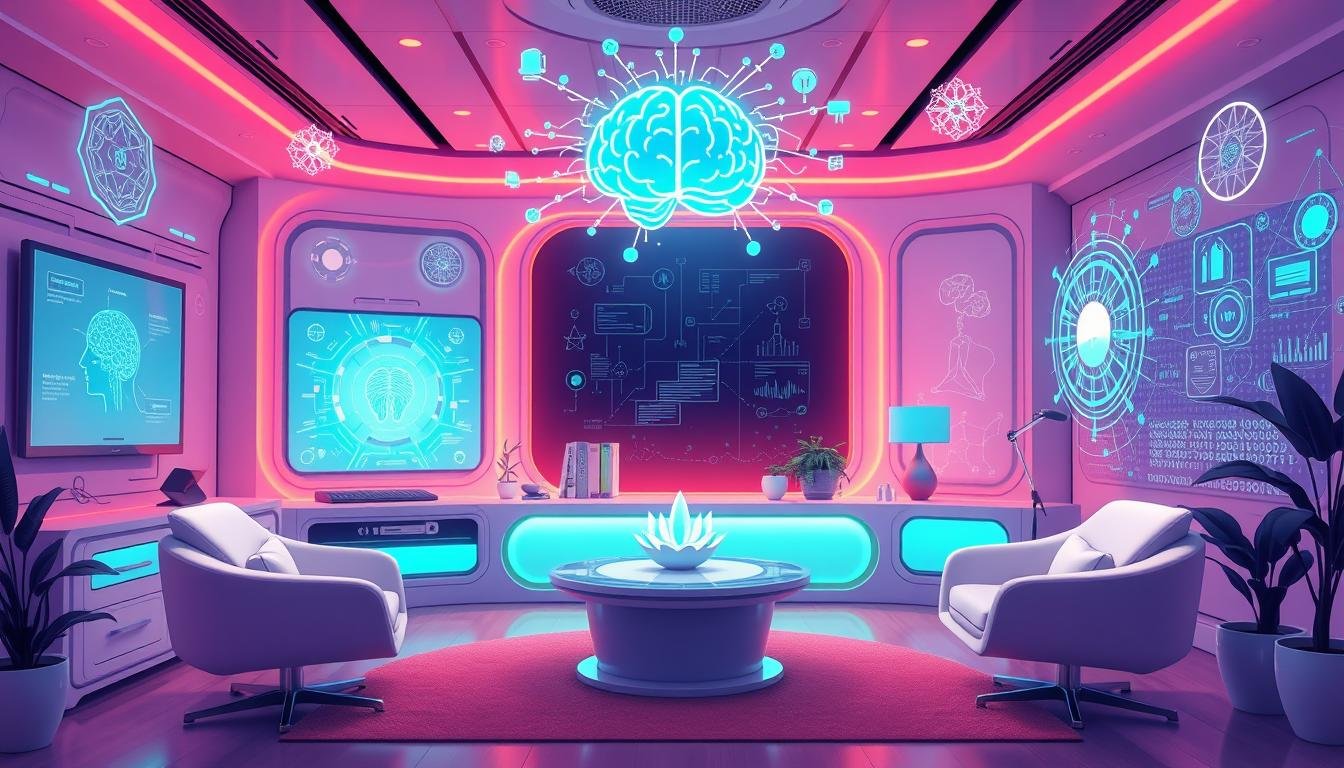Behavioral Health and AI: Innovations in Mental Health Care
What if the key to revolutionizing mental health care lies not in the hands of humans, but in the digital fingers of artificial intelligence?
The use of AI in mental health is still new but could change everything. Health systems and startups are creating new apps that are getting a lot of attention. They are not just seen as interesting by doctors but also by investors who see the future.
AI is becoming a key part of mental health care. It’s helping with early detection, making therapy more personal, and keeping an eye on patients. AI uses advanced tech like machine learning and natural language processing to help diagnose and treat mental health issues. As we face more mental health problems because of COVID-19, AI is becoming a crucial tool for fast and tailored care.
Key Takeaways
- 77% of organizations have made AI regulations a company-wide priority.
- 80% of organizations are committed to developing ethical AI.
- AI-powered diagnostic tools utilize image recognition and natural language processing for precise disease detection.
- AI-driven solutions are crucial contributors to positive mental health outcomes.
- British startup Limbic’s e-triage tool shows a 93% accuracy rate in diagnosing common mental health disorders.
- Eleos Health’s AI technology reduces provider documentation time by over 50% and improves care outcomes three to four times.
- Prominent institutions like Cedars-Sinai Medical Center are pioneering AI-driven immersive therapy sessions.
Understanding the Role of AI in Behavioral Health
The *Introduction to AI in Mental Health* shows how AI is changing behavioral health. It makes care more accessible and better quality. For doctors, AI tools help a lot in diagnosing and making treatment plans for each patient.
AI helps improve patient results and cuts down on the need for old treatments like drugs.
AI can use data from many health records, like brain scans and genetics, to help diagnose quickly and accurately. Even with limited data, AI’s role is growing. A study found that most research used data from others, showing AI’s potential.
A survey of 34 health systems showed different ways AI is used. Half use a team approach, 40% work with AI teams, and 10% are led by IT. Despite worries about privacy and bias, AI could save a lot of money in healthcare.
AI might soon make mental health tools more affordable and accessible. But, there are worries about AI’s reliability and how it affects doctors. Studies show AI’s success in diagnosing mental health issues varies a lot.
AI can also help doctors understand mental illnesses better. This could lead to better treatments. But, doctors are slow to adopt AI due to privacy concerns and the lack of human touch. Overcoming these issues is key to AI’s success in mental health.
The *Introduction to AI in Mental Health* shows a big change in how we care for mental health. AI is making care better, especially in places where mental health services are hard to get. The future looks bright with AI helping in therapy and diagnosis.
Revolutionary AI Applications in Therapy
AI is changing mental health care in big ways. There aren’t enough mental health experts to meet the growing need. AI apps are stepping in, offering personalized help.
Virtual Reality and AI are leading this change. They make therapy more accessible and effective. At Cedars-Sinai, the XAIA program uses virtual reality and AI for therapy. It’s showing great results.
AI chatbots are becoming digital therapists. They offer a safe space for people to share their feelings. For example, Woebot provides emotional support and tracks conversations.
Wearable devices like those from Biobeat also play a role. They monitor health data continuously. This helps create personalized treatment plans, improving patient care.
AI helps solve the shortage of mental health professionals. It automates simple tasks, allowing experts to focus on complex cases. It’s important to test these AI apps to make sure they work well and are safe.
AI can also help diagnose mental health issues. It looks at big data to find patterns that humans might miss. This includes spotting suicidal thoughts, depression, and schizophrenia.
Machine learning can even predict suicidal behavior with 80% accuracy. This helps in planning care and acting quickly.
In summary, AI and Virtual Reality are making a big difference in mental health care. They make therapy more efficient, accessible, and tailored to each person. This is a huge step forward for both patients and healthcare providers.
AI for Early Diagnosis and Predictive Analytics in Mental Health
Today, mental healthcare is using Machine Learning to spot mental health problems early. Places like Cincinnati Children’s Hospital use AI to find risks in kids. This helps them get help fast.
Natural Language Processing helps turn lots of unstructured data into useful formats. This makes risk assessments more accurate. As mental health issues grow, predictive analytics become key. Machine Learning, a part of AI, looks at big data to find signs of mental disorders early.
AI can dig deep into Electronic Health Records to predict and classify mental health issues. Even though there’s no FDA-approved AI in psychiatry yet, its power is promising. It helps us understand the complex nature of psychiatric disorders.
AI also means people can get help anytime, not just when a doctor is available. This is important because there’s a big shortage of mental health providers worldwide.
Studies show AI’s big impact on mental health care. It helps find problems early and treat them quickly. This not only improves care but also helps doctors by doing tasks that don’t need a human touch.
In short, Machine Learning is changing mental healthcare. It uses predictive analytics, Natural Language Processing, and Electronic Health Records. AI is making it possible to catch mental health issues early and treat them better.
Behavioral Health and AI: Innovations in Mental Health Care
Digital phenotyping is changing mental health care. It uses AI to collect and analyze data from devices. This helps understand mental health better. With 450 million people worldwide dealing with mental health issues, new treatments are needed.
AI is leading to precision medicine in mental health. It tailors treatments based on a person’s behavior and genes. This makes treatments more effective and suited to each individual.
Most mental disorders start before 25. Digital phenotyping helps by monitoring and adjusting treatments as needed. This approach improves care and helps patients stick to their plans.
AI chatbots and wearable devices offer constant support. For example, AI systems like Limbic Access have increased mental health referrals by up to 15%. These tools help immediately and reduce the workload of health care providers.
There’s a big shortage of mental health professionals worldwide. AI helps by automating tasks. This makes mental health services more accessible and affordable.
| AI Application | Benefits |
|---|---|
| Digital Phenotyping | Precision medicine, tailored treatments |
| AI Chatbots | 24/7 support, crisis intervention, increased self-referrals |
| Wearable Devices | Real-time monitoring, alerts for potential issues |
| Automated Analysis | Reduced administrative burden, improved patient engagement |
Digital phenotyping and AI are changing mental health care. They promise more precise, efficient, and accessible treatments.
Ethical Considerations and Challenges of AI in Mental Health
The fast growth of AI in mental health care brings up many ethical issues. It changes how doctors and patients interact, raising questions about privacy and human oversight. It’s crucial to get clear consent, especially as AI starts to help diagnose and treat mental health problems.
AI systems can carry biases, which is a big worry in mental health care. These biases need to be fixed to ensure fair and respectful care for everyone. Experts are working hard to address these issues and make AI more inclusive.
Data privacy is a major challenge in AI for mental health. We need strict rules to use AI responsibly, making sure it’s fair and helps patients. AI can look at lots of data to help tailor care, but we must handle these ethical problems openly.
AI can help with many mental health issues, like lack of access and stigma. It can offer virtual therapy and track mental health, making care better and more accessible.
As AI becomes more common in mental health, we must talk about its ethics. We need to make sure AI is used in a way that keeps the human touch in care. This way, AI can help, not replace, the traditional ways of therapy.
| Statistics | Details |
|---|---|
| Article Accesses | 5942 |
| Citations | 8 |
| Key Concerns | Algorithmic Bias, Data Privacy |
| Essential Practices | Informed Consent, Human Oversight |
| Potential of AI | Individualized Care, Enhanced Accessibility |
| Applications of AI | Virtual Therapists, Mental Health Tracking, Diagnostic Tools |
Conclusion
The future of mental health care is bright with AI. AI has changed healthcare a lot, making things better and more efficient. It uses new data to help with mental health treatments.
AI models like neural networks can create new data. This helps make mental health therapies better. They are still new, but they could make treatments more personal and effective.
AI can also help diagnose mental health issues like depression and anxiety. It looks at big data to find patterns that humans might miss. This leads to better treatments that fit each person’s needs.
AI is changing how we see and treat mental health. But, we need to think about the ethics of using AI. The future of mental health care looks promising, with AI making treatments more personal and effective.
Source Links
- Artificial intelligence in positive mental health: a narrative review
- Will AI Help Address Our Behavioral Health Crisis? | AHA
- Exploring the Role of Artificial Intelligence in Mental Healthcare: Progress, Pitfalls, and Promises
- Exploring the Role of Artificial Intelligence in Mental Healthcare: Current Trends and Future Directions – A Narrative Review for a Comprehensive Insight
- Contributed: The future of mental health apps: revolutionizing healthcare with AI
- AI In Mental Health: Opportunities And Challenges In Developing Intelligent Digital Therapies
- Artificial Intelligence for Mental Healthcare: Clinical Applications, Barriers, Facilitators, and Artificial Wisdom
- How AI Predictive Analytics is Changing Mental Health Care
- AI Mental Health Applications – Mission Connection Healthcare
- Accelerating the impact of artificial intelligence in mental healthcare through implementation science
- Top 21 AI & Emerging Tech Use Cases for Behavioral Health in 2024
- Making the first step to mental health treatment easier with AI: Rogers introduces Limbic Access chatbot
- Ethical considerations in the use of artificial intelligence in mental health – The Egyptian Journal of Neurology, Psychiatry and Neurosurgery
- Artificial Intelligence in Mental Health Care: Management Implications, Ethical Challenges, and Policy Considerations
- Behavioral health and generative AI: a perspective on future of therapies and patient care – npj Mental Health Research
- AI in Mental Health: A New Revolution in Diagnosis and Treatment








